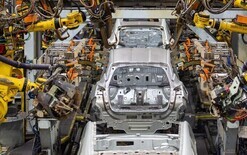Minister tells marques to sell ‘cleaner cars’

The government hopes its new feebate policy will send a signal to carmakers about the need to build and supply more electric vehicles (EVs) for the New Zealand market.
James Shaw, Minister of Climate Change, has defended the rebates scheme that was announced on June 13 and will kick in for EVs and plug-in hybrids (PHEVs) from July 1.
A range of discounts will be offered on imported vehicles with other low-emitting cars to fall under the programme from the start of 2022.
The clean-car standard, which comes into force from January 1 next year, will also levy fees on high-emitting vehicles being registered in our market for the first time.
Shaw, pictured, says the EV-friendly government policies will help improve New Zealand’s reputation among car manufacturers, which he adds has been “a stumbling block” in increasing import numbers.
“As a country we have been seen, not just as a small market, but as somewhat ambivalent about … more efficient vehicles,” he told the NBR.
He notes that until recently New Zealand was one of only three nations in the OECD without exhaust emissions standards.
“That sends a signal back to the marketplace and to vehicle suppliers to say, ‘Hey if you want to sell cars to New Zealanders, they’ve got to be cleaner cars’.”
David Crawford, chief executive of the Motor Industry Association (MIA) is less optimistic about New Zealand’s ability to influence the larger marques.
He told the NBR that left-hand drive markets such as Europe, China and North America are larger and more advanced in their uptake of EVs, so will be a priority for most carmakers.
Crawford says: “Over time the manufacturers will get around to making more EVs for the right-hand market or they’ll do what General Motors did, pulling Holden out of the right-hand drive vehicle market.”
Shaw also admits the feebate policy will initially be a “subsidy for the rich” as most consumers accessing the discount will be corporates, and middle and upper-income earners.
However, he hopes the measures will eventually lead to more EVs flowing into the second-hand market and the prices of those cars dropping.





